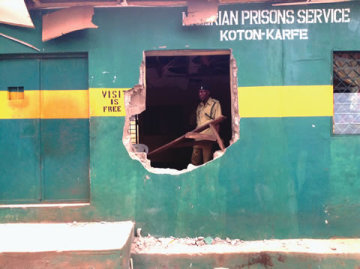Prisons are designed to keep custody of the legally interned, and by doing so, it helps to make the society safe from misdemeanants and lawbreakers who disturbs the peace of the society. Many are oblivious of this fact.
When criminals and other dangerous elements are locked up in the prison, the society is insulated from their nefarious activities, thereby making the society safe for habitation and cohabitation. Hence, the prison is a vital part of the security set up of every society.
The prison is like a recycling industry. In a recycling industry, waste products are processed for use again. In other words, waste is processed into wealth.
The prison is a recycling industry for those that the society has rejected. In the prison, criminals and other offenders are recycled into responsible and law-abiding citizens who will contribute meaningfully to the society after their release from prison.
It is expected that criminal elements, felons and psychopathic deviates that disturb the peace of the society and are put away in prison, should undergo reformation and rehabilitation, and eventually reintegrate into the society as law abiding citizens. The prison is a place for behaviour modification and change.
In Nigeria, the situation of the prison institution is abhorrent. The prison is in a situation of abject neglect thereby hindering it from achieving the mandate expected from it. The status quo in our prison is antithetical to the ideal situation of a prison. It is no news that inmates come out more hardened than they were before imprisonment.
An offender who was sentenced for stealing, for instance, would metamorphose into an armed robber during imprisonment. This is the extent our prisons have been degraded.
Our prisons are no longer the recycling industries they use to be, where criminals are equipped and transformed into well meaning citizens; they are now garbage bins where inmates are deformed and transfigured into hardened criminals.
Our prisons lack professionals like psychologists, social workers and other behaviour modifiers. Most workshops in our prisons are obsolete and not functional, thereby hampering the mandate and the essence of establishing the prisons.
Worse still, our prisons are antiquated; most of the laws establishing them are of the colonial era. The physical structures are in a sorry state. The funding of the prison sector is so meagre. The system has been bastardized by corruption.
The staffs are ill-trained and lack the skills to correct. The situation of our prison is synonymous to a madhouse. Our prisons are now garbage bin where bad elements in the society are dumped to rotten, and forgotten.
Prisoners can be equipped with alternative and legitimate means of livelihood, they can be de-radicalized and reformed into better citizens who will contribute meaningfully to national development.
All that is needed is to do the following: The federal government should establish a Prisons Service Commission which will see to the effective administration of the Nigerian Prisons Service. It is noteworthy to know that among the arms of the criminal justice system, it is only the prison that has no commission of its own.
Prison budget should be increased to make funds available for some pressing needs in the prisons. Presently, prisoners are fed on less than four hundred naira (two dollars) per inmate per day. This is further depleted by bottlenecks and corruption.
This is grossly inadequate going by the present economic realities. Again, most prisons are ill-equipped with security gadgets, medical drugs, lightening and electricity, escort vehicles, office equipment, and so on. Proper funding of the prison sector would improve the condition of our prisons.
The welfare of prison staff should be put on the front burner. Prison staff should be effectively and constantly trained. Training and retraining of prison staff should be taken serious owing to the nature of their job. The job of a prison officer is demanding and requires constant reorientation and debriefing to meet with the current trend in the area of corrections.
The prison training institutions should be upgraded and expanded for efficient output. The elite Prison Staff College in Kaduna should be upgraded to the status of a university.
Specialized training schools should be built to train staff of the different sections and units in the Nigerian Prisons Service like the dog section, the surveillance unit, the intelligence unit, the medical unit, the industry unit, the Agric unit, and so on. This will help to improve professionalism and better service delivery.
State governments should be compelled to set aside a percentage of their monthly allocation for the funding of the prisons in their jurisdiction. Since most of the inmates in the prisons are convicted or remanded by state courts, it is only fair that state government should be stakeholders in the funding of the prisons. The constitution can be altered to accommodate this provision.
Finally but not exhausted, the Nigerian Prisons Service should collaborate with the National Directorate for Employment (NDE), the National Open University of Nigeria (NOUN), the Small and Medium Enterprises Development Agency of Nigeria (SMEDAN) and other relevant agencies to train inmates in education, handicraft and skills so as to equip prison inmates for life after prison. By so doing, the inmates will lead law abiding lives when they are eventually released.




 Premier League
Premier League